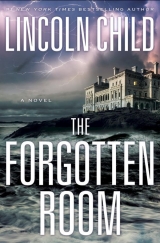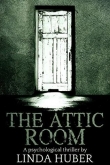
Текст книги "The Forgotten Room"
Автор книги: Lincoln Child
Жанр:
Триллеры
сообщить о нарушении
Текущая страница: 8 (всего у книги 19 страниц)
22
It was nine o’clock in the evening when Logan rose from the desk in his quarters on Lux’s third floor and walked over to the nearest window. The bad weather had finally won out over the good and a storm had settled over Newport. Swollen clouds scudded before the moon, and sheets of wind-driven rain beat against the panes of leaded glass.
He stared out at the storm-lashed ocean – pounding fiercely against the coastline – for several minutes, lost in thought. Then he turned back to the desk. It was covered with notes he had taken following various interviews, along with brief dossiers on a dozen of the scientists and administrators at the think tank: Roger Carbon; Terence McCarty; Perry Maynard; Laura Benedict, the quantum computing expert. Life, he had learned, had been especially unkind to Ms. Benedict recently: in addition to losing her mentor, she was doubly bereaved – her grandfather had died of cancer a few years before, and not long after she’d been tragically widowed. Her husband, an aviation enthusiast, had died in a midair crash with another small plane during a storm – perhaps a storm not so different from this one.
He flipped through the pages on his desk for a minute, then pushed the folders aside. Beneath them was another: a file on Kim Mykolos. He’d made a point to sit at her table that evening for dinner, and had found that – when the conversation did not turn to Strachey, obviously still a painful subject – she was witty and charming, an excellent conversationalist. She had also borne out the fact that Strachey had, in fact, been like a father to Laura Benedict. Logan’s empathetic instincts assured him of what he’d already deduced: that, whether out of misapprehension or spite, Carbon was wrong about Kim – she had not been after Strachey’s job.
Turning to his computer, he brought up his encrypted spreadsheet on “the others” and reviewed it one more time, just to be sure. But there had been no mistake in his deduction.
He paused, looking at the screen, for several minutes. Then he turned off the computer. It was time.
Picking up the printed phone directory for Lux, he turned pages until he found the number he wanted: Dr. Olafson’s private quarters. Picking up the phone, he dialed.
It was answered on the third ring. “Olafson.”
“Gregory? It’s Jeremy Logan.”
“Jeremy. I penciled a note on my calendar to call you tomorrow morning, discuss your progress.”
“That’s why I’m calling. I wondered if I could drop in for a few minutes.”
There was a pause. “Now?”
“If you’re not otherwise occupied.”
The sound of shuffling papers came over the line. “Of course. I’ll be expecting you.”
“Thanks.” Logan hung up the phone and, without bothering to grab his satchel, quickly exited the room.
23
Olafson lived in a large suite of rooms at the far eastern end of the Lady’s Walk. He answered the door, not in his usual dark suit but in a V-necked cashmere sweater over khakis. A tumbler of whiskey, poured neat, was in one hand. “Ah, Jeremy,” he said, shaking hands. “Come in.”
“Sorry for the short notice,” Logan said. “But I didn’t see why this should wait.”
Olafson led the way down a corridor and into the living room. In stark contrast to the mansion’s Edwardian appointments, the director’s rooms – as the abstract expressionist paintings in his office could have hinted at – were furnished in Bauhaus style. Chrome and leather chairs of smoothly curved and polished tubular metal were offset by glass-topped tables and strange, ziggurat-styled bookcases straight from the Marcel Breuer school. Large windows set into both the east and south walls offered dramatic views of the storm.
“Scotch?” Olafson said, heading toward a wet bar.
“A couple of fingers, thanks.”
Olafson picked up another tumbler, splashed some Lagavulin into it, then brought it over to Logan and ushered him to a chair. He took a sip of his scotch, waiting for Logan to begin.
“The first stage of my work is complete,” Logan told the director. “I’ve reviewed all the reports and dossiers, watched the surveillance videos, done a thorough background investigation on Strachey, reviewed his work, spoken with everyone who interacted with him during the last seventy-two hours of his life. I’ve done everything, followed every avenue, a standard investigation would encompass.”
“And?”
“And I agree with what you told me when I first arrived five days ago. Willard Strachey was a man who had everything to live for. He’d had a highly rewarding career and was looking forward to an equally rewarding retirement. This was not a man who would commit suicide – and, as you said, he was a man whose temperament would be utterly opposed to such an act.” He sipped his drink. “Something happened to Strachey in the last few weeks of his life. Something that changed him utterly, that forced him to kill himself, and to do so immediately. And I’ve become convinced that something has to do with his work in the West Wing.”
“The West Wing,” Olafson repeated.
“Specifically, with the secret room. There’s a connection – I know there is. But in order to learn what it is, if I’m going to learn what happened to Strachey…I need to know the purpose of that room.”
There was a sudden crack of thunder; a moment later, the room glowed with the livid glare of lightning.
Olafson frowned. “I don’t know, Jeremy. That seems a bit of a stretch to me. What could his work on the renovation have to do with his suicide?”
“Strachey had the keys to the wing. He’d been working for months on its redesign and restoration. He knew it better than anyone else. And don’t you remember that small, hammer-sized hole in the wall of the room? It had been plastered over. You said it yourself: that means he might already have discovered it.”
Slowly, Olafson put his drink down on a nearby table. “That’s right. I did say that.”
“I told you I’ve done everything a standard investigation would cover. Now, it’s time for me to undertake a nonstandard investigation.”
“And what does that entail?”
“Learning the riddle of the forgotten room.”
“Riddle,” Olafson said. “Interesting word.”
“But that room is nothing but riddles. What was its purpose? Why doesn’t it appear on the architectural plans? Why was it secret in the first place? And why did Strachey happen to kill himself when he learned – or was about to learn – of its existence?”
Olafson didn’t answer.
“There’s something else. ‘The others’ Carbon spoke of – the Lux residents who had been seen, in recent weeks, acting in an uncharacteristic or unusual manner – they told me of seeing, hearing, or smelling things that weren’t actually there. They spoke of strange compulsions – in one case, a suicidal compulsion. But the most interesting fact is that the four individuals all either lived, or worked, in the shadow of the West Wing.”
“Are you sure of that?” Olafson asked.
“I’ve double-checked my observations. I’m sure.”
Olafson reached for his drink.
“If I’m going to solve this mystery, I need your permission to shift my focus: to the West Wing and, in particular, the forgotten room.”
Olafson took a long sip from his drink. He sighed. Then, slowly, he nodded.
“I’m also going to need an assistant.”
Olafson frowned. “What?”
“I’m a historian, an enigmalogist – I’m not a mechanical engineer. I need somebody who possesses skills I don’t have if I’m to stand any chance of unlocking this riddle.”
“But we agreed the existence of the room was to be kept secret.”
“I know. But the more I’ve thought about it, the clearer it’s become that I can’t solve this alone.”
This was followed by a brief silence.
“I don’t know, Jeremy,” the director said at last. “Strachey’s death was bad enough, but that room…it must have been sealed for a good reason. We can’t afford any stain on Lux’s escutcheon.”
“I’ve heard that speech before. And I’m aware of how delicate the situation here is. But this is the only chance you have of learning what happened to Strachey.”
Logan watched as the director went silent, thinking. “It would have to be somebody on whose discretion we can utterly rely.”
“I’ll vouch for her utmost discretion.”
“Her?” Olafson said in surprise. “You’ve got somebody in mind already?”
“Kim Mykolos. Strachey’s assistant.”
“Why Mykolos? I mean, she’s not even a Fellow, for heaven’s sake.”
“She’s the perfect choice. She knows Strachey’s work better than anyone – and, with all the workmen scattered to the four winds, that goes for his work on the West Wing as well. She’s up to date on the people and politics of Lux – and she’s honest enough to give me straight answers. But most important, one of her specialties is reverse engineering. And I need someone who can help me ‘reverse engineer’ that room.”
“Jeremy, I’m not sure I can sanction that,” Olafson said. “I doubt if the board would approve.”
“Does the board know about the forgotten room?”
“No, of course not.”
“Well, they don’t need to know about this, either.”
“But we’re such a private, insular organization…involving Mykolos would go against all our principles of compartmentalization and secrecy.”
“Doesn’t suicide go against Lux’s principles, as well?”
Olafson didn’t answer.
“As I said – it’s the only way you’re going to get the answers you seek. And don’t forget: I’m here because you don’t know what happened to Strachey, or why. Look at those other four, and what happened to them. Can you afford to just wall up the West Wing and look the other way? Who knows what else might happen in the future? You’d be turning your back on a ticking bomb.”
Olafson sighed. “If you put it that way, I guess I have to agree.”
“Thank you, Gregory.”
The director looked around the room a moment before settling his gaze again on Logan. “When do you plan to start?”
“First thing tomorrow.” And Logan drained his drink.
24
As Logan was returning to his own room on the third floor, another resident, in a small set of rooms in a far section of the second floor, was pacing restlessly. The lights were out, and the only illumination came from the flickering tongues of lightning beyond the mullioned windows.
After several minutes, the pacing stopped. The person, apparently coming to a decision, walked over to the phone, then dialed a number with a 401 area code.
The call was answered on the first ring by a gravelly baritone. “Operations. Abrams.”
“You know who this is, right?”
“Yes,” the man named Abrams said.
“You were responsible for what happened today, weren’t you? That run-in with Logan on the road.”
“How did you learn about that?”
“I heard him talk about it at dinner. Besides, it’s hard to keep anything private in a place like Lux. But that’s beside the point. Are you crazy, doing a thing like that?”
“But he knows about the room. You said it yourself. If he pokes around in there, it could ruin everything.”
“What would ruin everything is your killing him right in town. That’s not what we agreed. He’s too high profile. You’ll only raise suspicion. You might even wreck my cover.”
“Logan is an unknown variable in the equation. We can’t afford to let him remain at Lux.”
“He won’t learn anything. I’ve been too careful for that.”
“That’s a chance we can’t take,” said the man named Abrams. “The stakes have grown too high. If only he’d waited a few more days before—”
“Well, he didn’t. We have to play the hand we’ve been dealt. Look – no more going behind my back. No more making any rash decisions without consulting me. Otherwise…otherwise, I’ll back out. Take the item elsewhere.”
“You wouldn’t be that foolish. You’re in it too deep.”
“Then you listen. We’re going to do this my way. I believe Logan thinks what happened was an accident – and it’s a good thing for you that he does. If he gets suspicious, he’s going to become ten times as dangerous as he already is.”
“So what, exactly, is ‘your way’?”
“Logan is my problem – let me deal with him. I know just what to do.”
“You’re going to…?” The voice on the far end of the line trailed off.
“Precisely.”
“Don’t wait too long. The clock is running, and we don’t have much time.”
“That’s why I’m going to act fast.” And with a sharp click, the call was disconnected.
25
“This is weird,” said Kim Mykolos. “Seriously weird.” She was standing in the middle of the forgotten room, staring around in slack-jawed fascination.
When Logan had let her in on the secret – after securing the necessary promises of utter confidentiality – the young woman’s reactions had been first disbelief, then shock, and then consuming curiosity. Leaning against the worktable, Logan watched as she moved around, peering at this and that, reaching out to touch something, then quickly pulling back her hand as if afraid of being burned.
The tungsten lamp stood in a bare corner, providing a strong illumination but also splashing deep, jagged shadows against the far wall. Turning toward the worktable, Logan opened his duffel, pulled out a video camera, and then a portable music player, which he placed beside the unknown implements and turned on. The calmly syncopated rhythms of Jazz Samba wafted quietly over the room.
“And you say that whatever research was going on in here stopped abruptly in the midthirties?” she asked.
Logan nodded.
“And the room was sealed off and remained forgotten to this day?”
“So it seems. And all the notes and records of whatever went on here have apparently vanished from Lux’s files.”
“What about Dr. Strachey? Did he discover this room before…” Her voice trailed away.
“I don’t know for sure. But it’s quite possible.”
Mykolos pulled herself away from her examination and glanced over at Logan. “So why me, exactly? How can I help?”
“You were his assistant. You’re got a background in computer logic, in reverse engineering. I need a mind like yours if I’m going to solve this room.”
“Solve it?”
“Yes. I’m convinced that only by solving its puzzle will I learn why Strachey died. And besides, from a purely practical standpoint I need a second pair of hands.” He hefted the video camera. “I want you to use this to document everything we do here.”
Mykolos nodded slowly. “So how do we start, exactly?”
“I’ve given that a lot of thought. I think the most important thing is to understand the purpose of that.” And he pointed to the oversized, coffin-shaped device of polished wood that sat in the center of the room.
“I was wondering about that. It looks sort of like a mystery machine on steroids.”
“A what?”
“A mystery machine. Something from the old penny arcades. A big box of wood or metal, with question marks all over it but no obvious features – no handles, levers, knobs. You put in your penny and then kicked it, banged it, tried to figure out how to make it do whatever it did.”
“Well, don’t kick it, please.”
Mykolos nodded toward the bulky metal suits that hung from a metal bar on the far wall. “What do you make of those?”
“I can only assume they’re some sort of protective gear.”
She walked up to the closest, took it gently by one wrist, and moved the arm up and down, watching as the fanlike elbow joints telescoped to accommodate the movement. “Protection from what?”
“That’s what we’re here to find out.” He motioned her over to the central device, handed her the video camera. “You see those brass plaques screwed into the base, there and there? Those are manufacturers’ imprints.”
Mykolos turned on the camera and pointed it at the indicated plaques, filming both.
“I’ve looked into the names on those plaques. Elektrofabriken Kelle was a German electronics firm founded in Dresden in 1911. It has since merged with so many companies that its original purpose has become obscure. And in any case, all its records were destroyed in the firebombing of 1945. Rosewell Heavy Industries was an early manufacturer of sound and radio equipment. It went out of business in the fifties. I haven’t been able to learn much beyond the fact that it made highly specialized equipment for industrial use.”
Mykolos panned the camcorder slowly over the device. Then she thoughtfully caressed the appendages that sprouted irregularly here and there: gently curved panels of rosewood, carefully fitted and locked to the central mechanism, itself completely encased in wood. She walked over to the thick end of the device, looked at the roman numerals etched into the floor beyond. Next, she walked around to the narrow end and filmed the heavy wooden housing that was locked in place onto it. Lowering the camera, she pointed at the two words, BEAM and FIELD, etched into another brass plaque just beneath the cowling, raising her eyebrows at Logan as she did so.
“As good a place to start as any,” he said. Approaching, he examined a wooden keyhole set into the housing directly over the plaque. Plucking a flashlight from his duffel, he gave it an even closer examination. Then, pulling a set of lockpicks from his pocket and laying the flashlight on top of the housing, he started working on the lock.
“Odd skill for a professor of history,” Mykolos said as she filmed the process.
“Don’t forget, I’m an enigmalogist, too.”
A brief silence settled over the room, broken only by the low sounds of samba. “What’s with the Stan Getz?” she asked after a moment.
“I’ll tell you if you promise not to laugh.”
“I promise.”
“I’m what’s known as a sensitive. An empath. I have a knack – if you can call it that – for hearing things, sensing things, that people felt or experienced, whether in the present or in the past. This room is…unpleasant. I’ve been hearing music – hearing it in my head. Stan Getz helps me to tune it out.”
“What kind of music?”
“Wild arpeggios, giant clashing clusters of notes, waves of sound. Unsettling melodies, almost insolently virtuosic.”
“You could almost be describing Alkan.”
Logan paused. “You mentioned him before. Wasn’t he a favorite composer of Strachey’s?”
“Charles-Valentin Alkan. Perhaps the strangest composer who ever lived. Yes, Willard was a huge fan. In fact, Alkan was the only composer other than Bach thematically and harmonically complex enough to interest him. I think it was his mathematical turn of mind.”
Logan reapplied himself to the lock, and a second later there came a click as the last pin crossed the shear line. Straightening up, Logan placed both hands on the rosewood cowling and carefully lifted it. Beneath lay a row of buttons, with two knobs – one above the BEAM label and the other above the FIELD label – sporting matching antique VU meters and sets of switches. Everything was remarkably free of dust.
“What do you suppose all this means?” Mykolos asked, putting the camera aside and shaking out her jet-black hair.
“You tell me. You’re the propeller-head, remember?”
For a moment, they looked at the controls in silence. “Do you see anything that looks like an on switch?” Logan asked.
“No. But I wouldn’t look for one near these controls. I’d look on the side, below, nearer whatever machine powers this thing.”
Logan hunted around the base of the wooden housing until he found a much smaller cowling attached to the near edge. Once again employing his lockpicks, he managed to remove it after about ten seconds of manipulating the pins. Beneath were two switches, one marked PWR and the other LOAD.
“Bingo,” Mykolos said, looking over his shoulder, video camera once again in hand, eyes widening in excitement.
Logan reached forward to flip the power switch, then hesitated. “Should we?”
“Won’t get any further if we don’t.”
Gingerly, he took hold of the switch, then flipped it into the on position. At first, there was nothing. Then there came a low humming, almost beneath the threshold of hearing. He placed one hand on the main housing. It was now vibrating slightly.
“Anything?” Mykolos asked as she filmed.
Logan nodded.
“What’s that?” And she pointed to the LOAD switch.
“It probably connects a load from a voltage source.”
“In other words, like throwing a car from neutral into drive.”
“Basically, yes.”
They looked at each other, then at the switch. Even more gingerly this time, Logan reached forward and placed the tips of his fingers on it.
“You think maybe we ought to put on those suits of armor first?” Mykolos said, only half joking.
Logan did not reply. He took a firm grip on the LOAD switch, flipped it into the active position.
Nothing happened.
“Broken,” Mykolos said after a moment.
“Not necessarily. We don’t know the function of all those switches and dials on the front panel. They probably do the real work. But let me see if I can get the rest of these cowlings off first.”
Logan turned off the load switch, then the power switch. The faint vibration stopped and the device came to rest. Then, one after the other, Logan picked the locks of the two wooden housings fixed to the flanks of the device, and then, lastly, the metal plate covering the wide far end. Removing the two cowlings revealed complex gizmos of metal and rubber. One reminded him of a bulky, futuristic antenna; the other a kind of labyrinthine radiator, sporting two rows of horizontal tubes.
He shook his head. It seemed that each bit of progress they made with this strange device just yielded up fresh mysteries.
They bent over the antenna-like device. “What do you make of it?” Logan asked. “Does it ring any bells?”
“Look at this faceplate.” And Mykolos pointed to a legend beneath the contrivance that read, in small letters: EFG 112-A. PATENT 4,125,662. WAREHAM ELECTRIC COMPANY, BOSTON. TOLERANCES 1–20 MG, .1–15 MT.
“ ‘mG,’ ” Logan read aloud. “Do you suppose that’s milligauss?”
“I think so. And I think mT stands for microtesla.”
“Then this thing is a…” Logan fell silent.
“A primitive electromagnetic field generator. And that” – she pointed at the lower section of the assembly – “is probably a rotatable pickup coil.”
Logan took a step back from the machine.
“What is it?” Mykolos asked.
Logan did not reply.
“What is it?” she repeated, frowning.
“One function of such generators,” Logan said at last, “is to detect changes in electromagnetic fields.”
“Yes, I recall that from my electrical engineering courses. So?”
“In my line of work, they’re used for a specific kind of electromagnetic change. Distortions caused by paranormal events.”
Surprise, then disbelief, crossed Mykolos’s face. “You aren’t saying that this was a machine built to…to detect ghosts?”
“It seems possible. Interest in spiritualism and mysticism was big in the nineteen thirties, and—”
“Wait. You’re creeping me out here.” Now it was Mykolos’s turn to take a step back from the machine. “You think this thing was created to detect ghosts…and was abandoned because it didn’t work?”
“Perhaps,” Logan murmured. “Or perhaps because it worked too well.”








